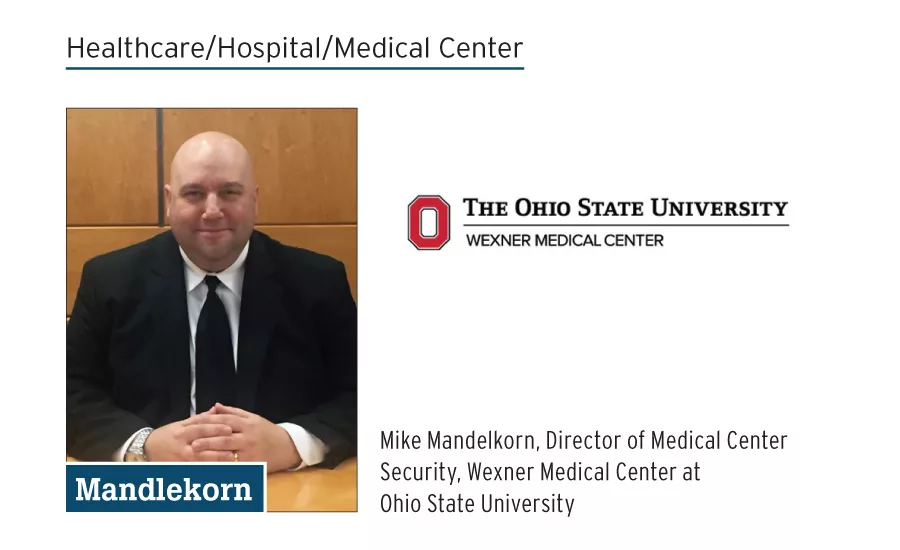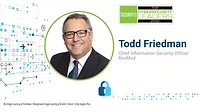Mike Mandelkorn: Improving Patients' Lives

Providing security services to the 92 facilities that comprise The Ohio State University’s Wexner Medical Center has Director of Medical Center Security Michael Mandelkorn juggling many balls at one time. “We’re a 24/7 operation that responds to emergency and non-emergency calls for service, completes patrols for various medical center facilities, and provides foot and vehicular escorts to staff, patients and visitors,” says Mandelkorn. “We process access control requests, service and install access control hardware, and process medical center ID badges and background checks for all medical center staff, volunteers, students and contracted employees.”
With a mission “to improve people’s lives through innovation and research, education and patient care,” Mandelkorn’s team is “committed to providing a safe and secure environment for all of our patients, staff and visitors in all areas of the health system,” Mandelkorn says. “In doing so, we contribute to the general welfare of the university community and surrounding campus areas. I’m really proud to work for a world-class academic healthcare organization.”
One of the biggest challenges Mandelkorn finds about the job is “keeping high risk areas safe, such as the pharmacies, women and infants units, the emergency department, and areas that contain nuclear sources,” he says. “I’d say the foremost challenge is probably maintaining the balance of an open, inviting atmosphere while ensuring a safe, secure environment for all of our patients, visitors and staff, without the feeling of being locked down.”
Like many security leaders, workplace violence is one of the areas on which Mandelkorn focuses. “Workplace violence comes in the form of both internal violence, such as aggression portrayed on behalf of patients toward staff or violence from visitors and unaffiliated subjects who may happen to be on the property, as well as external violence, such as the risk of an armed aggressor who may have intent to cause physical harm to individuals,” says Mandelkorn. “These are all significant concerns that we must analyze and prepare for to the best of our abilities.”
Maintaining good relationships with local law enforcement agencies, fire agencies, and peer medical facilities is “mutually beneficial and supportive of many public safety issues,” Mandelkorn says. The security team also works hard to provide a high level of customer service to patients and families. “We are actively engaged in the entire patient experience process. We assist with providing directions, helping individuals into wheelchairs, providing escorts, and following up on any patient-related concerns,” he says.
Both medical center administration and the university’s administration as a whole are very supportive of medical center security. “Our mission is recognized by our leadership, and we are consistently provided with the resource and support necessary to accomplish our mission on a daily basis,” says Mandelkorn.
Security’s value is measured both qualitatively and quantitatively. “This would include deterrents of criminal activity such as theft, robberies, workplace violence, and the willingness of our customers to call us for help. Our communication center received approximately 300,000 phone calls last year, both emergent and non-emergent,” Mandelkorn says. “By any metric or survey that I have seen, our communication center is one of the busiest healthcare security communication centers in the nation. Also, with regards to helping new employees complete the background check process, our ID processing division completed more than 12,500 background checks last year.” Mandelkorn also takes into consideration feedback and compliments from customers.
The fact that terrorism and random acts of violence are becoming more frequent throughout the world and in our own country is the most difficult part of Mandelkorn’s job. “While we make every effort possible to prepare for incidents such as these, every contingency cannot always be anticipated,” he says. “While we can be confident in our abilities to respond appropriately in emergency situations, the unknown factors of what may potentially occur, when it may occur, and how it may occur are the things that really make our work challenging.”
In his spare time, Mandelkorn is a big baseball fan. “I was born and raised in New York, so I’m a loyal Yankees fan,” he says. “I really enjoy watching and going to games with my 13-year-old son.”
Security Scorecard
Annual Revenue: $2.62 billion
Security Budget: $6.6 million
Critical Issues
-
Active Shooter
-
Mass Infectious Disease Preparedness and Protocol
-
Implementation
Looking for a reprint of this article?
From high-res PDFs to custom plaques, order your copy today!





